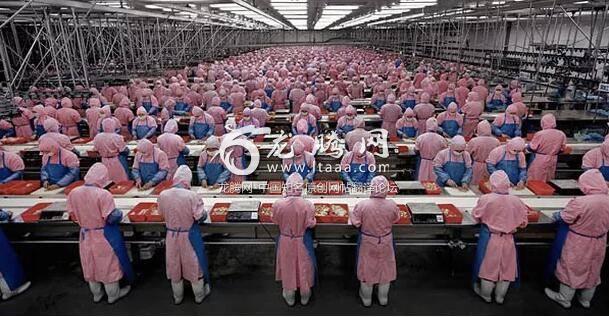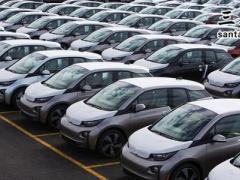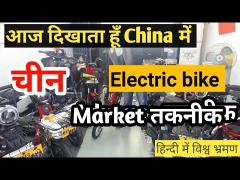中国已经不可战胜了吗?(三)-终篇 [越南媒体]
1978年改革开放以来,中国经历了前所未有的经济增长。看似无穷的廉价劳动力从农村来到城市,成为中国工业化的支柱,促进了中国的经济增长。几乎是同时,中国于1979年实施了另一项激进改革——独生子女政策。这项政策为了遏制不断增长的人口,提高人均GDP。在过去几十年里这两项改革重塑了中国的人口结构,现在却成为了中国面临的最大的挑战之一。
Part 3: Workforce
第三部分:劳动力
Since China opened up its economy to the world in 1978, the country has experience unprecedented growth. This growth fueled by the seemingly limitless cheap labor migrating from the countryside into urban areas to become the backbone of China’s industry. Around the same time another radical reform was implemented, in 1979 the One Child Policy came into effect. This was done in an attempt to curb China’s growing population and increase its GDP per Capita. These two reforms have reshaped China’s demographics over the last few decades but now have created one of China’s biggest challenges.
1978年改革开放以来,中国经历了前所未有的经济增长。看似无穷的廉价劳动力从农村来到城市,成为中国工业化的支柱,促进了中国的经济增长。几乎是同时,中国于1979年实施了另一项激进改革——独生子女政策。这项政策为了遏制不断增长的人口,提高人均GDP。在过去几十年里这两项改革重塑了中国的人口结构,现在却成为了中国面临的最大的挑战之一。
The same workforce that has powered the nation’s growth since the late 70s is now aging and with more and more going into retirement each year. This presents multiple issues for the country. Due to the One Child Policy, each generation is smaller than the previous. 38 years later and two generations in, the average person entering the work force has two parents, four grandparents that either retired or nearing retirement and no siblings. The current pension and social security programs are not robust enough to be able to support this aging population and the responsibility falls on the youngest generation entering the labor force. In 2013, China has imposed a new law that mandates working individuals to both provide for financially and visit their parents. This cultural virtue turned law, is in attempt to share the financial and psychological weight of taking care of the 222 million Chinese that are over the age of 60 representing 16.1% of total population. These figures are still rising.
70年代末以来,一直为国家经济增长提供动力的劳动力大军正在老去,退休人数每年都在不断增加。这给国家带来了多重问题。由于独生子女政策,与上一代相比,下一代的人口数量不断变小。38年经历了两代人,现在进入工作岗位的劳动力平均拥有两位父母,四位祖父母,这些老人要么已经退休,要么马上就面临着退休,不仅如此,这些劳动力还没有兄弟姐妹。中国目前的养老金和社会保障体系不够健全,不足以支持人口老龄化;赡养老人的责任就落在了刚刚参加工作的最年轻一代人身上。2013年,中国颁布了一项新法律,强制规定子女必须在经济上赡养父母,并经常去看望父母。中国目前年龄在60岁以上的人口有2.2亿,占中国人口数量的16.1%,将文化美德变为法律是为了从财政上和心理上替国家分担重任。而且中国老年人口的数量仍在上升。
With the shrinking workforce, demand for labor now outweighs supply. In the last 8 years, the wages of entry level jobs have doubled making it impossible for factories to be able to match the prices of goods that their customers have become accustomed to. This has resulted in many factories relocating to countries like Vietnam, Ethiopia, Nigeria, Pakistan, Bangladesh and Indonesia. The remaining factories are now turning to automation and the production of high-tech products. This shift to high-tech although necessary is making it harder for older people who are not yet ready to retire to find work. As technology moves forward, companies are reluctant to hire anyone over the age of 35. So when a factory relocates to another country, the workforce over the age of 35 left behind has few options. They often return to the countryside and have to rely on their children to take up the mantle.
随着劳动力人口减少,劳动力需求大于供给。过去的8年里,入门级岗位的工资翻了一番,这就导致了工厂成本增加,无法提供客户惯的产品价格。许多工厂搬迁到越南、埃塞俄比亚、尼日利亚、巴基斯坦、孟加拉国和印度尼西亚等国。而剩下的工厂则在积极转向自动化和生产高科技产品。这种产品升级虽然有必要,可是那些接近退休年龄,仍在找工作的中年人就面临着更多困难。随着技术的发展,公司不愿意雇用年龄超过35岁的员工。因此,当工厂搬迁到另一个国家,35岁以上的劳动力的选择就少了。一般来说,他们只能回到农村,靠孩子来养活。
The one child policy has now been relaxed to two children but this change may not be enough to replenish China’s labor force in the coming generations. Since the couples who are looking to start a family are generally both working and have to support potentially 4 parents and 8 grandparents, having more children proves to be difficult. Before the One Child Policy was relaxed to two children, a study was done where 3,000 women were given permission to have two children. They found that only 10% of the women actually had a second child. For now, China’s population is expected to continue aging and workforce shirking.
虽然中国的独生子女政策现在已经放宽为二孩政策,但这不足以补充中国未来几代的劳动力。由于组建家庭的夫妇通常各自都有工作,而且可能要赡养4个父母和8个祖父母,那么对他们来说再多养孩子就很吃力了。独生子女政策放宽到二孩政策之前,曾经有一项针对3000名中国女性是否愿意生育第二个孩子的调查。研究发现只有10%的女性愿意生育第二个孩子。目前,中国人口仍将持续老龄化,中国劳动力也将持续短缺。
Being able to produce and export more low cost manufactured goods than any other country for decades has given China the title “Factory of the World.” Yet, that once cheap labor is now becoming one of China’s largest economic burdens and vulnerabilities. A smaller workforce has to divert a significant portion of income and national budget to support China’s aging population. As a nation that is reluctant to open its borders to migrants to replenish the workforce and population, China has yet to come up with any significant long term solutions. One of the largest challenges that China has to overcome in its rise on the global stage comes from within. Its once greatest strength is now its Achilles Heel.
几十年来,中国凭借制造和出口比其他国家更多低成本产品,赢得了“世界工厂”的美誉。然而,随着年龄的增长,曾经的廉价劳动力现在正成为中国最大的经济负担和弱点之一。为了应对人口老龄化,规模较小的劳动力个人不得不将收入的很大一部分投入到支持国家老龄化人口,而国家也不得不投入大量预算。作为不愿通过开放边境移民来补充劳动力和人口的国家,中国尚未提出任何长期的有效的解决方案。中国在全球舞台上崛起所面临的最大挑战之一来自内部。曾经最强大的力量现在成了最致命的弱点。
[-]FortunaCaecaEst
What is untouchable? If you ask a Chinese, the first reaction would likely be about the Dalits in the Indian caste system.
什么是untouchable?如果问中国人,他们的第一反应可能是印度种姓制度下的达利特人。
I guess the author should use the word "unassailable" to remove this ambiguity, but from the articles I can't get whether the author is saying China has become unassailable or not.
As a Chinese I don't get this: Why do China want to keep its labor cost low in the long term? Low labor cost is essentially equivalent to a lot of people having low standards of living. The CCP is now in a more secure position than, say, 1997, rightly because people have a much higher standard of living. If magically we go back to $100/month labor costs back then, people will be up in arms to overthrow the CCP gov't.
我认为作者应该使用“unassailable(无懈可击的、不可战胜的)”来消除歧义,从文章中我没看出来中国是如何无懈可击、不可战胜的。
作为一名中国人,我不明白:为什么中国要长期保持廉价劳动力?廉价劳动力本质上意味着很多人生活水平较低。中国共产党现在的处境比1997年安全多了,因为人们的生活水平提高了很多。如果中国一夜之间回到了每月100美元工资的时代,我敢肯定人们一定会武装起来推翻政府。
What China wants (by encouraging more births) is a better age structure, which will benefit in all aspects of the economic/fiscal situation including pension, social security, medical expenses, tax, public debt, consumption, real estate, etc..
Plus, simply adding more people (by birth/immigration) may or may not lower the labor cost. More people may cause housing/food/water shortages and hence increase the living cost -- which makes workers demand a higher wage just to survive. This is the situation happening right now in some Chinese mega-cities.
中国鼓励生育,希望获得更好的年龄结构,这种年龄结构可以让中国在经济、财政等各个方面受益,包括养老金、社会保障、医疗费用、税收、公共债务、消费、房地产等。
另外,通过鼓励生育和增加移民来简单地增加人口,也许无法降低劳动成本。更多的人口可能会导致房屋不足、食物和水短缺,从而增加生活成本。工人为了生存就会要求更高的工资。而这也正是目前中国一些大城市正在发生的情况。
Also, this is simply fake news:
As technology moves forward, companies are reluctant to hire anyone over the age of 35. So when a factory relocates to another country, the workforce over the age of 35 left behind has few options. They often return to the countryside and have to rely on their children to take up the mantle.
What was reported in the news (Sorry, can't find English source) was leaked internal memos of one company, Huawei, planning to lay off workers over the age of 34. Said workers are software/hardware/support engineers with college/graduate degrees and high income, and are urban residents who don't have a countryside to return to. This is not a widespread practice either. The news has little to do with low-skilled workers, whom, if you bother to visit China, you can find many working well beyond the age of 35.
【随着技术的发展,公司不愿意雇用年龄超过35岁的员工。因此,当工厂搬迁到另一个国家,35岁以上的劳动力的选择就少了。一般来说,他们只能回到农村,靠孩子来养活。】
我觉得这是一篇假新闻:
新闻报道称,抱歉我没有找到英文来源,华为公司泄露的内部备忘录显示,该公司打算解雇年龄超过34岁的员工。报道称这些员工主要是拥有本科或者研究生学历的软件工程师、硬件工程师和服务工程师。这些人都是城市居民,根本没办法回到农村老家。而且这不是普遍情况。这篇新闻报道和低技术工人没有多大关系,如果你来中国的话,会发现很多低技术工人的年龄都超过35岁。
[-]sparky_sparky_boom
Growing labor costs in China are no problem if the average productivity of each worker increases at a higher rate. Firms pay more to their workers, but their profits also increase, and they're incentivized to stay and invest in China to grow the economy. But if average wages grow faster than average worker productivity, the share of GDP going to firms decrease, they decide to invest their profits elsewhere, and the economy slows. Demanding wages grow faster than worker productivity is harvesting your apples before they're ripe.
如果工人平均生产力增长的速度更快,那么劳动力成本上升就不是问题。虽然企业支付了更多工资,但是企业利润也增加了,企业就会以物质激励留住员工,继续在中国投资,促进经济增长。如果平均工资增长高于工人平均生产力增长,流向企业的GDP份额就会下降,企业就会将利润投资到其他地区,中国经济就会放缓。要求工资增长高于工人的生产力,就是在揠苗助长。
[-]gpar44[S]
An interesting report done by the Financial Times does include the mention that "companies are reluctant to hire anyone over the age of 35." The link to the video is https://youtu.be/t487ILVf87k and at 4:20 into the video is what I'm talking about. I do encourage watching the whole thing. I believe you'll agree that Financial Times are not "Fake News." Of course, there are a lot of workers over the age of 35 but it's still worth noting that it does become harder to find employment the older one gets.
《金融时报》有篇有趣的报告,文章提到“企业不愿意雇佣年龄超过35岁的人”。这篇报道有视频链接。视频4:20处就是。我建议大家完整得看一下视频。《金融时报》的报道不是“假新闻”了吧,我觉得你会认同这篇报道。当然,肯定有很多员工年龄超过了35岁,但是值得注意的是,随着年龄的增长,找工作也变得越来越困难。
China's wages have increased significantly for unskilled labor and the middle class is growing at an incredible rate. This is very impressive and the article in no way suggests that China should regress to it's earlier cheap labor model. The facts worth noting are that such progress demanded a change in the goods manufactured because there are many countries eager to attract factories by offering cheaper labor. Therefore, China looks towards high-tech manufacturing. The second point worth noting is that the labor force is shrinking because of the one child policy. Going back to cheap labor isn't the solution, increasing the workforce as a whole and keeping higher wages and the high-tech production could be.
中国非熟练劳动力工资大幅增长,中产阶级以令人难以置信的速度增长。这让人印象深刻,这篇文章绝没有说中国应该回到早前劳动力廉价的时期。值得注意的是,这种进步对中国产品要求发生了变化,因为许多国家都希望通过提供更廉价的劳动力来吸引企业。因此,中国将目光转向高端制造业。第二点值得注意的是,由于独生子女政策,中国劳动力正在减少。总的来说,回归廉价劳动力并不能真正的解决问题,提高劳动力整体水平,提高工资水平,保持高端制造业才是真正解决问题的办法。
[-]swapwaspspaw
such progress demanded a change in the goods manufactured
But wasn't this the whole point of "Made in China 2025"? If this is the main point of the author, I feel he or she is saying the obvious.
【这种进步对中国产品要求发生了变化】
这难道不是“中国制造2025”计划的主要目标吗?如果这是作者的主要观点,我觉得作者在陈述一个显而易见的事实。
[-]sndream
Without defining what is the meaning of untouchable, this article won't go anywhere
如果文章没有定义什么是不可战胜,那这篇文章就没有任何意义。
[-]Hbd-investor
As if part 1 and part 2 wasn't bad enough.
This only further cements the fact that whoever is writing these articles lacks the qualifications and understanding of china to perform a analysis. Furthermore the author seems to only have a high school level understanding of economics. And is unashamedly biased in the green energy, scandinavian socialist, refugees welcome camp.
难道前两部分还不够差劲吗。
第三部分近一步证明了这个事实:撰写这篇文章的人能力不足,对中国不够了解,分析问题根本不到位。此外,感觉作者对经济学的理解只有高中水平。而且作者对绿色能源、北欧社会主义者、难民集中营存在着明显的偏见。
As for actual objections to said article the author somehow believes that rising wages are a bad thing, and the lack of a social safety net for the elderly is a bad thing.
The author also uses the economic fallacy that all human labor is fungible. And encourages China to open the immigration floodgates to Africa on the basis that having as many workers as possible working for the lowest wages possible would make the economy stronger.
如果说我对这篇文章最不能接受的,那就是作者莫名其妙的认为工资上涨是坏事;老年人缺少社会保障网也是坏事。
文章还有一个经济谬误,就是认为所有劳动力都是可替代的。作者鼓励中国向非洲移民敞开大门,作者提供的依据是:廉价劳动力人口数量越多,国家经济就会越强大。
[-]rtfs2
I don't know if we are reading the same article but I don't see where the author "believes that rising wages are a bad thing." From what I gather it only says how the rising wages are the reason for factories moving to other countries with cheaper wages. So China moves towards high tech. That's just progress if anything.
咱俩看的是同一篇文章吗!我没看到作者“认为工资上涨是坏事”。根据我的理解,文章说得是工资上涨导致了工厂迁往其他工资较低国家。因此,中国制造正在转向高端行业。这么看来应该是一种进步。
Basic logic suggests that one child per family for a couple generations reduces overall population so again I don't understand what is wrong in discussing it. So the consequences of it make sense.
About immigration for example, the US and Canadian economies benefit from cheap Mexican workers or skilled immigrants from all over the world. Plus it helps the population grow when fertility rates are not keeping up.
最基本的,如果一个家庭只有一个孩子,那么几代过后,总人口数量肯定减少,我就不明白了,讨论这个问题有什么不对吗。这种讨论很有意义。
以移民为例,美国和加拿大经济因为廉价墨西哥工人和来自世界各地的技术移民而得益。如果人口出生率无法跟上,移民确实有助于人口增长。
In terms of green energy why not be impressed with the progress China is making. The more they invest in green energy the faster the price of such systems go down for everyone to a viable economic level. For a country that's the number one polluter I think it's awesome that they are investing so much in solar and wind.
还有绿色能源,难道你不对中国取得的进步感到印象深刻吗。中国对绿色能源的投资越多,对于处于不同经济水平的个人来说,相关成本降得就越快。作为污染排名世界第一的大国,中国在太阳能和风能领域能够大规模地投资,简直太棒了。
Again I didn't see any reference to refugee camps so send me a link of any article that I'm missing in the series. I think if anything the title puts people off and maybe that's something that should be addressed. But the content itself is quite interesting and well presented.
再说一遍,我没有看到任何关于难民营的内容,请把链接发给我,我要看看哪篇文章漏看了。我觉得如果文章标题让人反感,直接提出来。不过这篇文章的内容非常有趣,写的很好。
[-]Hbd-investor
Look its called context clues
What is the author trying to say? What ideas is the author trying to push? What are his intentions?
The author states the following in the following order
Low value chinese jobs are leaving
Chinese population is falling
China needs to let in immigrants
China's work force is bad due to 1+2+3
This implies that the author believes that China should keep the low value jobs by importing mass amounts of unskilled labor. and the 3 is the remedy for 1+2
The author is merely using this to push his policies, likewise part 2 was just RENEWABLES = GOOD, FOSSIL FUELS = BAD
看看上下文:
作者想说什么?作者试图表达什么观点?意图是什么?
作者按照下面的顺序表达了自己的观点:
1、中国低附加值的就业岗位流失;
2、中国劳动人口正在下降;
3、中国需要引进国外移民;
基于前面三条,我们知道中国劳动力市场不乐观
这意味着,作者认为中国应该引进大量非熟练劳动力来保证低附加值工作岗位。第三条是第一、二条的补救方法
作者就是这样来推动他的观点的。同样的系列文章的第二部分:可再生能源=好,化石燃料=坏
The author is just mindlessly repeating the policy of Scandinavia+ germany etc... and demonstrates no understanding of the issues at hand. For instance he never mentions nuclear, or the issues with solar energy and fossil fuel replacement, he didn't bother to crunch feasibility numbers etc...
作者只是在盲目地重复北欧和德国等国的政策,表明作者并不理解中国面临的问题。例如,作者没有提到核能,也没有提到太阳能和化石燃料替代,他都没有花时间经历来处理可行性数据等。
About immigration for example, the US and Canadian economies benefit from cheap Mexican workers or skilled immigrants from all over the world.
What exactly do you mean by benefit?
And no cheap Mexican workers have not benefited the US people
Yes food prices get cheaper, but actual Americans end up paying for it anyway with higher taxes, higher real estate prices, increased crime
The mexican may pay sales tax and lower the price of food, but Americans need to pay for schooling, infrastructure like sewage/water/electricity/emergency healthcare/crime/police+fire protection/ Minimum wage and they will need to compete for real estate.
【以移民为例,美国和加拿大经济因为廉价墨西哥工人和来自世界各地的技术移民而得益。】
你能说明美国和加拿大得到了什么好处吗?
美国人民没有从廉价墨西哥工人身上得到任何好处。
食品价格确实更便宜了,但是美国人付出的代价是更高的税,更高的房价以及犯罪率上升。
墨西哥人可能会支付销售税和降低食品的价格,但美国人支付的更多:教育、基础设施、污水、饮用水、电、紧急医疗、犯罪、警察+消防、最低工资和还要与竞争房地产。
In fact when all the math is done a US citizen needs to basically earn more than 60,000 per year to break even in taxes
The people making over 60,000 are net tax payers, which mean that they pay more taxes than they get back in subsidies/benefits/protection from being a US citizen
The people making under 60,000 are net tax consumers, which mean they pay less than what they receive
乱七八糟地算完,我们会发现美国公民年收入达到6万美元,才能在税收上达到收支平衡。年收入超过6万美元的是净纳税人,这意味着作为美国公民,他们交的税比得到的补贴、福利和保护多。年收入6万美元以下的是国家税收的受益者,这意味着他们缴税比收入少。
So a mcdonalds worker in the US lives far better than say a mcdonalds worker in Africa not because they flip 10 times more burgers but because they have a lot of wealthy people in the US to get wealth transfers from. The wealthy pays taxes to build and maintain the sewers, roads, water mains, dams, police, firefighters, schools etc... so the Mcdonalds worker can get first world infrastructure, cheap subsidized gas + electricity + tap water free protection by the worlds greatest military etc....
所以,美国麦当劳员工比非洲麦当劳员工生活要好得多,不是因为美国员工做汉堡的速度是非洲员工的10倍,而是因为美国的富人多,美国员工通过劳动将富人的财富转移到自己手上。修建和维护下水道、道路、自来水管道、水坝、警察、消防队员、学校等需要富人缴税。因此,麦当劳员工可以享受收到世界最强军队保护的世界一流基建,廉价的补贴天然气+电力+自来水等。
Again the author is alluding the mass migration from middle eastern and african migrants/ refugees. Since these areas are where the bulk of migration comes from since the bulk of the othrr countries (even countries like Mexico )have barely replacement ratio while numerous countries in africa + middle east have replacement ratio's like 5+
我也再说一遍,作者转弯抹角地提到了大量中东和非洲移民、难民。这里是移民的来源地,其他国家(甚至包括墨西哥这样的国家)的移民人口替代率比较低,而非洲和中东国家移民的人口替代率超过5%。
[-]gpar44[S]
This is the second part of a multi-part series of articles about China's repositioning on the world stage. Part 3 addresses what was for the longest time the backbone of China's economic rise, it's workforce. Due to the One Child Policy it now has an aging population and its workforce is not as cheap as it once was. This article explains the effects of China's changing demographics.
这是中国重新定位其世界舞台地位系列文章的三部分。第三部分阐述了中国经济崛起主要支柱是什么,那就是中国的劳动力。由于独生子女政策、人口老龄化,中国劳动力不再像以前那么便宜了。这篇文章解释了中国人口变化带来的影响。
[-]ld43233
They have massive internal problems and lack the kind of far reaching force required to be a world power.
Soon they will establish themselves as the middle kingdom. A place that you pay homage to for access to their sweet resources but otherwise is not very involved in other worldly affairs.
中国存在严重的内部问题,没有成为世界强国所需要的强大的力量。
中国很快就会建立起一个中央王国。如果你拥有这个王国需要的甜美资源,你就会对她充满敬意,否则,这个王国就不会参与到世界事务中来。
[-]NorthKoreanCuisine
“Untouchable” simply doesn’t exist. That simple
根本就没有什么“不可战胜的”。就这么简单!
版权声明
我们致力于传递世界各地老百姓最真实、最直接、最详尽的对中国的看法
【版权与免责声明】如发现内容存在版权问题,烦请提供相关信息发邮件,
我们将及时沟通与处理。本站内容除非来源注明五毛网,否则均为网友转载,涉及言论、版权与本站无关。
本文仅代表作者观点,不代表本站立场。
本文来自网络,如有侵权及时联系本网站。
阅读:
图文文章RECOMMEND
热门文章HOT NEWS
-
1
चाइना में रेडी और ठेले Local shops in china || L...
- 2
- 3
- 4
- 5
- 6
- 7
- 8
- 9
- 10
推荐文章HOT NEWS
-
1
चाइना में रेडी और ठेले Local shops in china || L...
- 2
- 3
- 4
- 5
- 6
- 7
- 8
- 9
- 10











